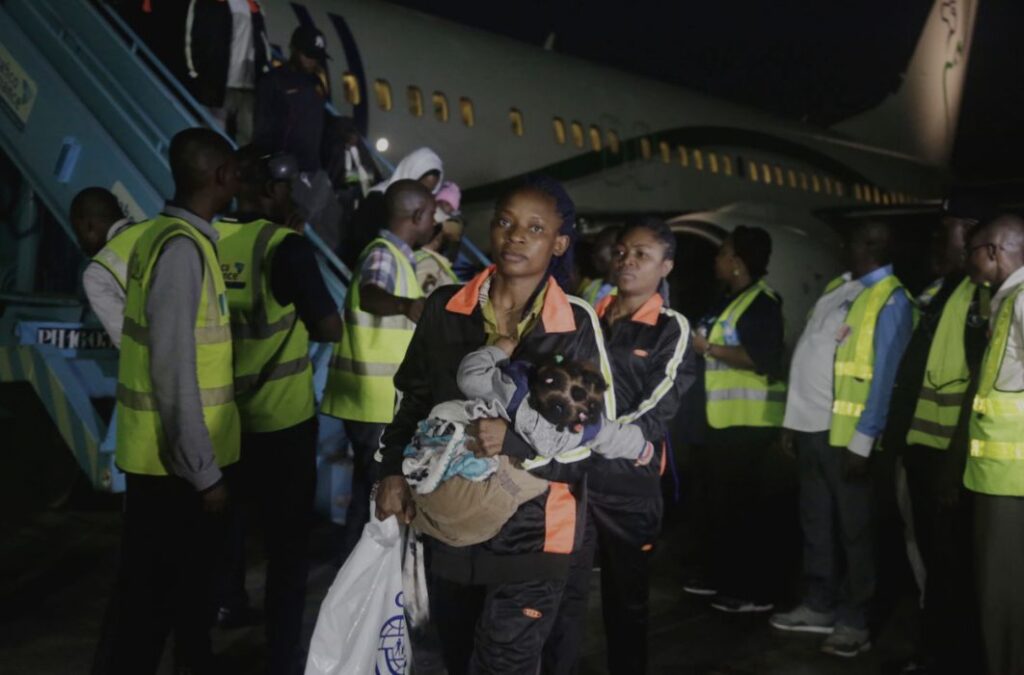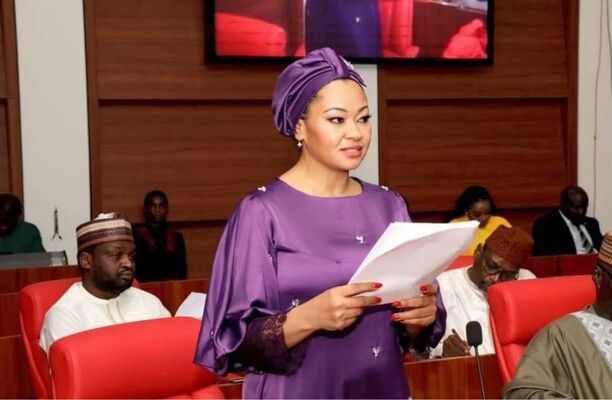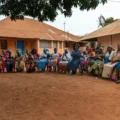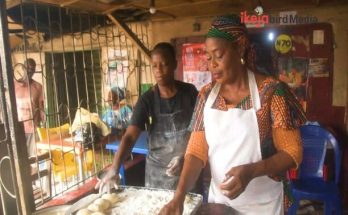By Sunkanmi Adewunmi
Edited by Ezennia Uche
On October 14, 2025, Nigeria’s Senate was thrown into a brief uproar when Senator Natasha Akpoti-Uduaghan (Kogi Central) moved an amendment calling on the government to rescue and repatriate Nigerian women and children held in Libyan prisons. In passionate remarks during a debate on human trafficking, Akpoti-Uduaghan warned that many of the imprisoned women are sex slaves in Libya’s jails, impregnated by guards and giving birth behind bars. She urged the Senate to order Nigeria’s Immigration Service and Prison Service to liaise with Libya’s authorities to bring these women and their babies home.
When Senate President Godswill Akpabio then asked for a seconder, however, an awkward silence fell. As one report noted, none of the other senators – men or women – immediately rose to support Akpoti-Uduaghan’s motion. Laughter and nervous murmurs spread as colleagues hesitated, forcing an embarrassing pause on the floor. Only after several tense seconds did Senate Leader Opeyemi Bamidele stand up “to save the day” and second the motion. Social media quickly picked up the incident, dubbing it a “mild drama” and decrying that lawmakers seemed to shun a humanitarian plea.
By the end of that session, however, the Senate did unanimously adopt the motion. In fact, just one day later the Senate formally urged President Tinubu’s government to launch urgent diplomatic and humanitarian efforts to free Nigerians in Libya. Senators cited reports of horrendous abuses – torture, rape, extortion and forced labor – recounted by nearly 1,000 Nigerian returnees from Libya in the first quarter of 2025. The legislative body called for swift repatriation and a comprehensive reintegration plan for survivors. Nonetheless, Akpoti-Uduaghan’s near-“snub” by her colleagues has fueled public outrage and questions about political priorities.
The Plight of Nigerian Women in Libya
The episode highlighted a well-known crisis: trafficking of Nigerian women across the Sahara into Libya, often en route to Europe. Thousands of young Nigerians – many from Edo and Delta states – are lured by false promises of jobs and education. Instead, they travel north through Niger and the desert, only to be intercepted by smugglers and militias. In Libya they may be detained arbitrarily, sold to traffickers, or abandoned in camps. According to Nigeria’s Diaspora Commission, an estimated 7,000 Nigerians are still trapped in Libya as of mid-2025. Many more attempted the journey: in just January–March 2025 nearly 1,000 Nigerians were flown back from Libya, and nearly allreported horrific mistreatment.
Conditions in Libya’s detention centers have been described by multiple sources as “modern-day slavery.” Amnesty International and the International Organization for Migration (IOM) have documented widespread torture, rape and even organ harvesting of migrants in Libyan prisons. Premium Times reports that many Nigerian survivors “recounted horrific experiences, including false detention, torture, sexual abuse, extortion, forced labour, and other forms of modern-day slavery”. Survivors tell of being beaten, starved and forced to work without pay. Women are especially vulnerable: Human Rights Watch has found that Nigerian girls and young women end up in Libya only to be exploited as forced prostitutes or domestic slaves. Many are given heroin, forced abortions, or have ritual juju oaths used to control them. One Nigerian activist estimates that traffickers sometimes harvest organs from victims for sale.

Humanitarian and NGO Reactions
News of the Senate incident and the broader crisis has drawn strong reactions from rights groups and advocates. Many Nigerian NGOs and diaspora associations have long campaigned for the government to do more. Amnesty International and other human rights organizations have repeatedly condemned Libya as a “corridor of death,” urging all stakeholders to end the abuses. In August 2025, Nigerians in Diaspora Commission (NiDCOM) chair, Abike Dabiri-Erewa warned that 7,000 Nigerians are “trapped” in Libya and called for “stronger collaboration” to tackle trafficking.
Locally, social media and civil society expressed indignation at the Senate’s initial hesitation. Women’s rights activists lamented that many senators, including female colleagues, failed to stand by a fellow senator calling attention to abused women. Policy think-tanks pointed out the irony that Nigeria – a signatory to the UN Palermo Protocol and the African Charter – has an international duty to protect trafficking victims. Indeed, the Senate itself cited these treaties when it decried the abuse of Nigerians abroad.
International bodies have not been idle. The United Nations and European Union have faced criticism for not pressuring Libya harder. Humanitarian groups argue that Libya’s official government lacks resources to enforce migrant protections, so regional bodies must intervene. In Abuja, Amnesty and IOM briefings have highlighted the need to treat returning women as victims deserving medical and psychological care. Both organizations welcome government resettlement programs and hope Nigeria will expand shelters for survivors.
Looking Ahead: A Call to Action
The public fallout from this Senate drama suggests Nigerians are watching closely. Whether the government will match words with deeds remains to be seen. The immediate next steps are clear: Nigeria’s Foreign Affairs and Interior Ministries must negotiate with Libya’s fragile authorities to secure the release of the imprisoned women. At the same time, agencies like NAPTIP must gear up to assist survivors upon return. Citizens and activists can press for accountability by demanding regular updates from the Senate committees now tasked with monitoring implementation.
Importantly, the episode underscores the power of vigilance: lawmakers cannot afford to ignore humanitarian crises without answer. Nigerians at home and in the diaspora should keep up the pressure – via media, petitions, or letters to officials – so that “nothing else is done,” as Senator Anthony Ani put it, “just to uplift the souls of those we have left behind”. The Senate’s resolution offers hope, but only sustained public attention will ensure these women are not forgotten. As this story unfolds, the country watches: will this moment of Senate drama in Nigeria spur real change, or will more of its vulnerable citizens suffer far from home?








